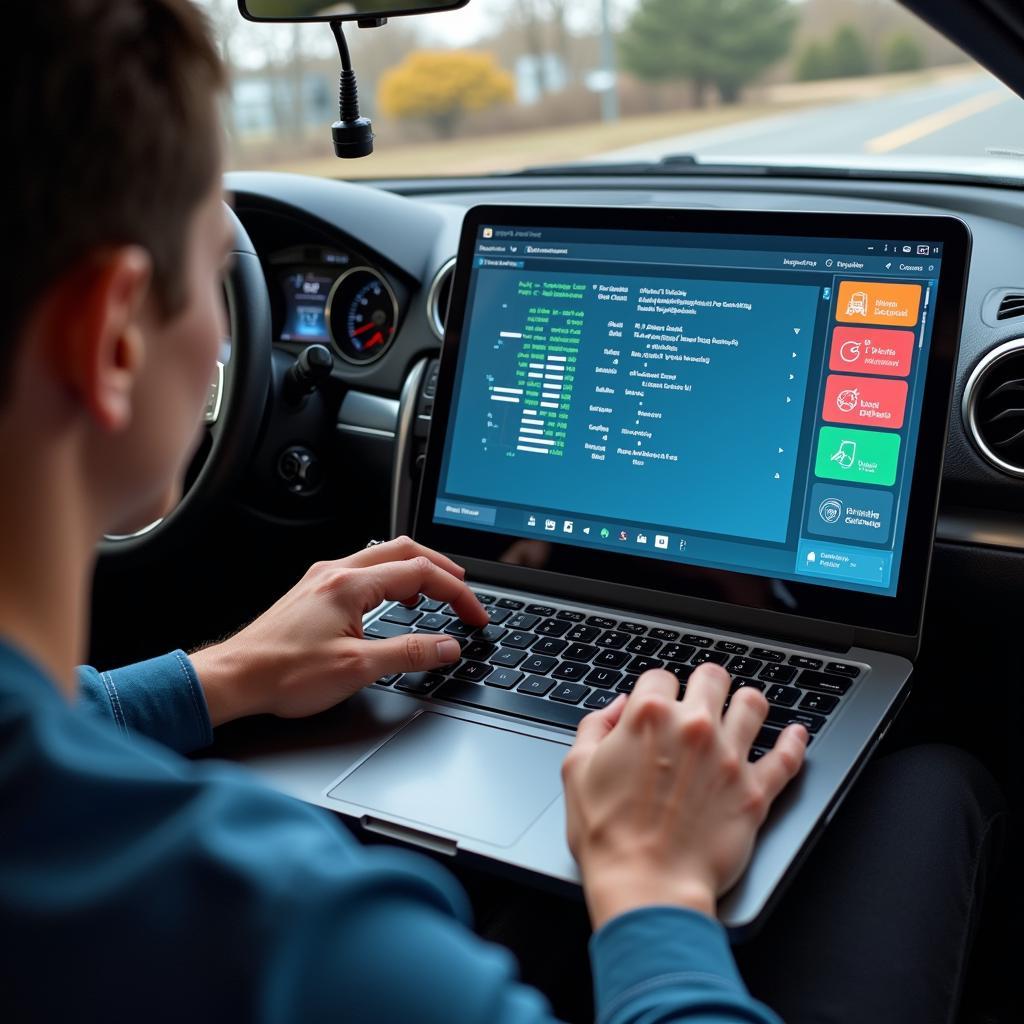If your car stalls after new battery installed, you’re likely experiencing a frustrating and potentially confusing situation. A new battery should solve power problems, not create them. This article will guide you through the common causes and solutions for this issue, offering expert advice and practical steps to get your car running smoothly again. Let’s dive in and get to the root of the problem.
Why Does My Car Stall After a New Battery?
Several issues can cause your car to stall even after installing a brand new battery. While it might seem counterintuitive, a new battery doesn’t eliminate the possibility of electrical faults, loose connections, or underlying mechanical problems. Here’s a breakdown of the most frequent culprits:
- Loose or Corroded Battery Terminals: Even with a new battery, the terminals can be loose or corroded, preventing proper electrical contact. This can interrupt the power supply to the engine, leading to stalling.
- Faulty Alternator: The alternator recharges the battery and powers the car’s electrical systems while the engine is running. A failing alternator can’t keep up with the demand, eventually causing the car to stall, even with a new battery.
- Bad Starter: Though less common with a new battery, a faulty starter can draw excessive power, leading to stalling, especially after the engine starts.
- Electrical System Issues: Problems like short circuits, blown fuses, or damaged wiring can drain the battery and cause the car to stall. These problems can exist independently of the battery’s condition.
- Fuel System Problems: Issues such as a clogged fuel filter, malfunctioning fuel pump, or faulty fuel injectors can lead to stalling, which can sometimes be mistakenly attributed to battery issues.
- Computer System Malfunctions: Modern cars rely heavily on computer systems. A software glitch or sensor issue can lead to stalling. Sometimes, disconnecting and reconnecting the battery can resolve these issues, but not always.
Troubleshooting a Car That Stalls After a New Battery
Now, let’s take a look at how to troubleshoot this frustrating issue:
-
Check the Battery Terminals: Inspect the battery terminals for corrosion or looseness. Clean any corrosion with a wire brush and baking soda solution. Tighten the terminals securely.
-
Test the Alternator: Use a multimeter to test the alternator’s output voltage. It should be around 13.5-14.5 volts. If the voltage is lower, the alternator might be failing.
-
Inspect the Starter: Listen for any unusual noises when starting the car. If you hear grinding or clicking, the starter might be faulty.
-
Check for Electrical Issues: Look for any signs of damaged wiring, blown fuses, or short circuits. A professional mechanic may be needed to diagnose complex electrical problems.
-
Inspect the Fuel System: Check the fuel filter, fuel pump, and fuel injectors for any issues. If you suspect a fuel problem, a professional mechanic should diagnose and repair it.
-
Scan for Diagnostic Trouble Codes (DTCs): Use an OBD-II scanner to check for any error codes stored in the car’s computer. These codes can pinpoint specific problems with the engine or electrical systems.
“Often, car owners overlook the simple things like loose battery connections,” says automotive expert, John Miller, ASE Certified Master Technician. “A quick check and tighten can save you time and money.”
Addressing Common Issues
If you find a new car battery keeps going flat, it is essential to address the underlying problem. It’s crucial to investigate further, especially if the battery is brand new. If you discover a brand new car battery dead, then you definitely need to take action. Understanding how to charge completely dead car battery can also be helpful in this situation.
auto battery draining overnight
new car battery keeps going flat
Remote Diagnostics and Programming
In today’s technologically advanced world, remote diagnostics and programming can play a vital role in identifying and resolving these types of issues. Utilizing advanced software, expert technicians can remotely access a vehicle’s systems to pinpoint the root cause of the problem. This innovative approach often saves time and money, allowing for quicker and more efficient repairs.
 Remote Car Diagnostics Using Software
Remote Car Diagnostics Using Software
“Remote diagnostics has revolutionized the way we approach car repairs,” explains automotive electronics specialist, Sarah Chen, “allowing us to diagnose and address issues remotely with incredible precision.”
Conclusion
A car stalling after a new battery installed can be caused by several factors, ranging from simple loose connections to more complex electrical or fuel system issues. By following the troubleshooting steps outlined above, you can identify the culprit and get your car back on the road. Remember, if you’re unsure about any of these steps, consulting a qualified mechanic is always recommended. Don’t let a stalling car ruin your day – address the issue promptly and effectively.
charge completely dead car battery
FAQ
-
Can a bad alternator drain a new battery? Yes, a failing alternator can’t recharge the battery, leading to draining and stalling.
-
How do I know if my car’s computer is causing the stalling? An OBD-II scanner can retrieve diagnostic codes that indicate computer or sensor issues.
-
Should I disconnect the battery after installing a new one? Disconnecting the battery for a short period can sometimes reset the car’s computer and resolve software glitches.
-
How long should a new car battery last? Typically, a new car battery should last 3-5 years, depending on usage and climate.
-
Can extreme temperatures affect battery performance? Yes, both extreme heat and cold can negatively impact battery performance.
-
Is it safe to jump-start a car with a new battery that stalls? Yes, it is generally safe, but always follow proper jump-starting procedures.
-
What are the signs of a failing starter? Grinding or clicking noises when starting the car are common indicators of a faulty starter.

